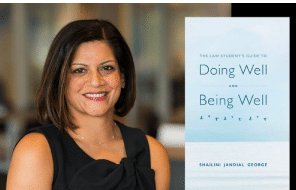The National Jurist reports
Want to rock law school? Lose the phone! (Well, at least now and then …)
They sap batteries … and brains.
Think of all the distractions they offer: One can text, email, scan Twitter and Instagram, listen to a podcast, check the weather, book a hotel, shop for clothes, make a restaurant reservation, rate the restaurant, shoot a video, take pictures, bet baseball, watch baseball, buy baseball tickets …
You can even make a phone call …
Suffolk Law Professor Shailini George has written a book, “The Law Student’s Guide to Doing Well and Being Well,” that looks at research on our addiction to distraction — cellphones, in particular — and offers practical, research-based advice on what law students can do to reclaim their focus.
“Once your brain is used to on-demand distraction, that becomes a powerful addiction which impacts your brain’s ability to concentrate when you want it to,” said George, who teaches legal writing at the Boston school.
In short, that means you can’t study as well.
These distractions mess with how our brain operates, she said. Studies have proven it too. The brain’s parietal lobe is used to absorb distractions. When that’s in use, it weakens the brain’s prefrontal cortex, which is used for focus.
One study looked at several groups of college students. One had to leave their phones in another room. Still another had phones on their person, but stored out-of-sight in a purse or pocket. Still another had phones on their desks. The group with the phones in another room did best. The ones with phones at the ready did worse, and it didn’t matter if the phone was off or turned over. Just knowing it was there was enough to mess with the prefontal cortex. It’s called a “brain drain,” she said.
It’s pretty alarming at how we’ve grown so dependent on this stimulus. In another study, people were asked to sit alone for 15 minutes without a phone or reading material. Just them.
“Afterward, most subjects reported that they found it difficult to concentrate and that they did not enjoy it,” she said. Then researchers asked the participants to do it again, “only this time they gave volunteers the added option of occasionally giving themselves a mild electric jolt.”
Amazingly, two-thirds of the men — and one-quarter of the women — shocked themselves at least once.
“Our brains crave novelty and distraction,” she said, “but that distraction does not bode well for the optimal brain performance you need for success in law school and later in practice.”
As she notes in the book’s introduction: “Clients rely on us to think, analyze, argue, persuade, creatively solve problems, and more. Literally, we are paid to think. But have you ever considered how to create the conditions for your brain to perform its best, for you to think deeply and clearly, to be in your best cognitive condition?”
Her book offers solutions that don’t call for any kind of radical actions, such as living like monks. Indeed, one should continue to use technology but in a more planned fashion.
The book also offers tips on other ways to improve brain power, such as exercise and eating and sleeping well.




